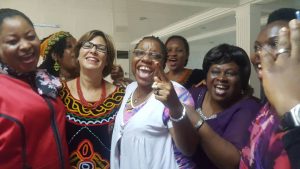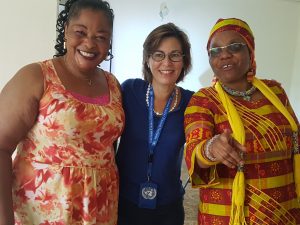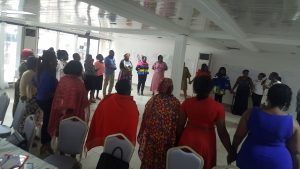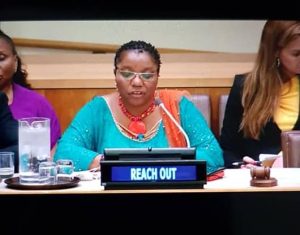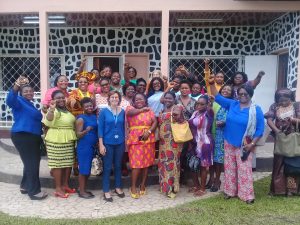When I arrived in Cameroon in August 2018, women, as in many African countries, were very visible at work, in the shops, in the families, keeping together a country plagued by corruption, violence, weak governance and outdated patriarchal institutions. But they were invisible from the political arena. Even at the Ministry for Women’s empowerment, my interlocutor was a man. At the UN Women where I worked, the discourse was about protecting “women and children”, pushing women in the same category as children, into one group of victims deprived of any form of agency, objects of our assistance. I felt that the objective was not to transform the outdated, patriarchal and corrupt institutions; but to please the government and seduce the donors. Merely talking about the anglophone crisis was taboo.
The causes of the anglophone crisis include discrimination, perceived lack of opportunities but also the arrogance from the Centre. The initial, non-violent claims by anglophone lawyers and teachers was met with contempt and repression. At the UN, we organised our meetings with civil society in Yaounde, not in the conflict-affected Northwest and Southwest regions. How were we to know who is doing a real job on the ground? I wanted to show respect and go and listen to the anglophone women in their turf and in their own terms. In spite of warnings from the top UN peace adviser (“You can be kicked out of the country; there’s not much to see/do in Buea anyway; if I was you I wouldn’t go”), I travelled to Buea with the support of my boss.
On my way, I stopped in Douala where I met with Cardinal Tumi, the Lead Convenor of the Anglophone conference, the only peace initiative on the table. We had a long discussion. He spoke of the upcoming Conference. I asked him: “Should only men represent the anglophone point of view?” He marked a pause. After a few minutes he admitted: “It never came up; we never thought of it”. During that initial meeting, he accepted to include women and put me in touch with Conference organiser Dr Simon Munzu. “You have great women”, was my line. “They are not coming to clap. They will have something to say. If you accept this, we will do our share; we will prepare them”. They accepted. I travelled to Buea with these good news in my pocket.
There, I met wonderful, skilful, courageous and articulate women. All women present were civil society leaders, and most of them had elected to join their efforts under a new umbrella organisation, the South West/North West Women’s Task Force -SNWOT. I was impressed by all of them, particularly the SNWOT leader Esther Njomo Omam Njomo. This was the week preceding the pre-electoral shutdown announced by the armed groups. And here, these women, most of whom were hosting IDPs and had to organise reserves for the coming days, had braved the security situation, had put aside their very real daily worries, and came to the meeting I had called for. That meant high commitment, and it also meant respect for the international institutions. Oh God! I hoped we wouldn’t fail them.
With the women in Buea on 19 September 2018.
They gave me a very good briefing on what was going on in the conflict-affected area. I realised that they were the women who can change the paradigm in Cameroon. They had the energy, the deep understanding of the crisis and the courage. When I told them that they were going to participate in the Anglophone Conference, they were thrilled. “We didn’t know we could join” they said. I was appalled to see once more that very capable women didn’t feel they were authorised to contribute. We agreed to work together to prepare their participation.
My intention (and my mission with the UN Women) was to make women count in peace and security issues in Cameroon, beyond this conference. My approach was three-pronged:
- advocate for their participation in any decision concerning the country (with the authorities, the Convenors of the anglophone conference, the diplomats in Yaounde, the UN etc). Bring to Cameroon women with high visibility like Nobel Prize winner Leymah Gbowee or negotiators from the Northern Ireland conflict, to showcase the added-value of women’s contributions.
- provide them with technical skills (on peace processes, mediation, agenda-drafting, comparative learning) so they could make more effective contributions to these fora
- give them visibility (bring them along to high level meetings, have them invited to regional or international fora)
A lot of good energy and sharing during the Douala workshop in November 2018. Experts Agus Wandi and Webster Zambara joined me to co-facilitate. It was a very successful event.
This plan worked brilliantly because:
– These women were competent and dedicated and they had a true leader who helped us organise complicated events in a difficult political environment
– They had their own disagreements, but unlike most of their male counterparts who were obsessed with power and personal gains, they were happy to discuss the core issues and look for solutions to the crisis
– They just needed someone to believe in them and that was my role. My status of a consultant protected me in a way, because I could take risks
– I had by then built a solid network of contacts and many allies and friends helped me. We also benefited from a context where most donors and diplomats lacked ideas and initiatives about this crisis and we filled the vacuum. SNWOT became the only show in town. They supported us.
The Anglophone Conference was not authorised by the government. But Esther and her group did not need anymore an invitation. During a workshop I organised for them, they established a plan of action and they started running their own activities. In a very daring move, they successfully organised a press Conference in Yaounde, the Centre of power. They articulated their own agenda.
Today, 14 May, Esther Njomo the Reach Out Director and SNWOT leader gave a briefing to the UN Security Council on the humanitarian situation in the Northwest and Southwest regions of Cameroon (to watch the briefing: https://www.youtube.com/watch?v=2gkBht8pWSU)
True to her own self, she did not make it a personal victory. “I am here to talk on behalf of those women, mothers, wives, sisters, and daughters who have lost it all to the crisis. Those who are trapped in the bushes, in the forests because they lost everything they could hold onto”, she said.
At the end of her very precise and compelling speech, she launched an appeal for the cessation of hostilities and for dialogue.
“ It is time for us to silencing the guns
It is time for us to start talking”
What are the lessons from this story?
Lesson #1: If you believe in women and give them a chance, you won’t be disappointed.
Lesson #2: you only risk a career move, they are risking their lives daily. Be courageous!
Lesson #3: We need to improve the protection of women human rights defenders.
The first meeting in Buea, where it all began

